It wouldn’t take a mandate – or subsidies – to get people to buy an electric car that could go almost 700 miles, that could get going again in just a few minutes, that could carry a family comfortably and only cost a little bit more than $28k.
There is such a car.
It is called the Camry hybrid.
Yes, it’s not entirely electric. But electric cars aren’t entirely “zero emissions,” either. Tailpipe emissions-free not being the same as zero emissions.
Besides, what good is a “zero emissions” car – assuming it is one – that only a relative handful of people can afford to buy and which isn’t practical for most?
What It Is
The Camry hybrid is a part-time electric car that’s basically the same car as the Camry, Toyota’s popular mid-sized family sedan.
It’s almost the same price, too.
The regular Camry stickers for $26,220 to start; the same thing with a part-time electric drivetrain stickers for $28,355. A top-of-the line Camry hybrid XSE stickers for $33,795 – vs. $31,520 for the non-hybrid Camry XSE.
What’s not the same – or rather, one thing that’s very different is that the hybrid Camry can go almost 700 miles on about 13 gallons of gas – because it averages 50-plus MPG.
What’s New for 2023
An updated Nightshade package is available. It bundles 19 inch matte-bronze finished wheels with special paint/trim.
What’s Good
Range, cost to buy – and drive – put EVs to shame.
Long-drive comfortable.
Family car practical.
What’s Not So Good
Vehicles like this one – that work, that people can afford – aren’t being encouraged anymore.
The hybrid Camry has a 2.5 liter four cylinder engine, like the non-hybrid. Neither is turbocharged and both tout about the same power – 208 horses for the hybrid vs. 203 for the non-hybrid.
The difference is the hybrid’s engine is augmented by an 88 kilowatt electric motor and lithium-ion battery, very similar to what you’d find in an electric car – just not entirely responsible for moving the car.
This is how a hybrid eliminates the range-recharge-waiting issues that beset electric cars. The motor/battery work in tandem with the engine, which is also not entirely responsible for moving the car.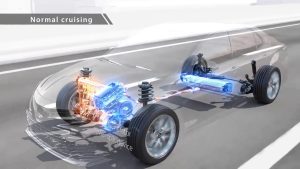
The system cycles the engine off when it’s not needed to move the car, as when coasting/decelerating or just sitting.
This saves a lot of gas that would otherwise be burned.
Thus the hybrid Camry’s stupendous 51 miles-per-gallon in city driving and an even better-than-that 53 miles-per-gallon on the highway – averaging out to 52 miles-per-gallon.
That’s about 20 miles-per-gallon better, on average, than the non-hybrid. It’s also better than the slightly more pricey ($31,895 to start) Honda Accord hybrid’s 46 city, 41 highway. (It’s about the same as the Hyundai Sonata hybrid’s 50 city, 54 highway; the Hyundai is also just a little bit less expensive ($28,100) to start.
The hybrid Camry also has long legs.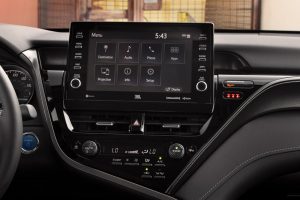
It can travel 699 highway miles on 13 gallons of fuel – that latter being about three gallons less than the non-hybrid’s 15.8 gallon tank holds. The Toyota can roll hundreds of miles farther down the road than any electric car can go under ideal conditions. If it’s very cold (or very hot) out, EVs often go less far than the advertise because batteries aren’t as efficient in the very cold and EV batteries draw power to prevent them from getting too cold (or too hot) which reduces the amount of electricity available to power the car.
The Camry’s battery isn’t so afflicted, in part because the engine recharges it as loses charge.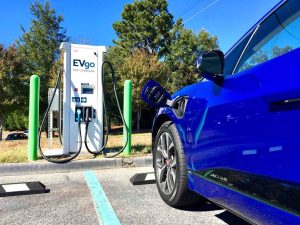
This also means you will never have to sit around waiting for a charge.
Its batteries are never run down to the EV equivalent of “empty” because the system prevents that from happening. A purely battery-powered car must run itself down to nearly empty to travel as far as its manufacturer claims it will go.
Unless, of course, you stop for a “top-off” mid-way through your trip.
This is more than just an inconvenience. It is also a problem.
Heavily discharging any battery is bad for it – in terms of reducing its capacity to retain a full charge. Heavy discharge/recharge cycles – especially if the charging is done with high-voltage “fast” chargers – do just that.
Faster.
But you almost have to do that, if you drive an EV more than about half as far as it can go on a full charge.
This is one of the Catch-22s you buy into when you buy an electric car. It is one that doesn’t exist with a hybrid car, which you can drive as far as it will go on a tank without giving the battery a hard workout.
There are some additional – subtler – advantages to partial electrification. The first is that a car like the hybrid Camry doesn’t need a huge, hugely heavy – and hugely expensive – battery pack. The hybrid weighs 3,480 lbs. That’s only 170 lbs. more than the non-hybrid Camry. A Tesla Model S sedan – which is just slightly larger than a Camry – weighs 4,561 lbs.
Almost all of that difference being the weight of the latter’s batteries.
Being heavy is at odds with efficiency. And big batteries are at odds with affordability. The main reason electric cars cost so much more than other cars is because their batteries cost so much, which they do in part because they are so huge and to make them requires a huge amount of expensive raw materials.
And – Catch 22, again – they have to be huge (and so, expensive) in order to be able to store even half the energy-equivalent of enough gasoline to power the car for a couple hundred miles of driving. For an EV to be capable of traveling as far as the Camry hybrid can go, it would need an even larger, even heavier battery pack.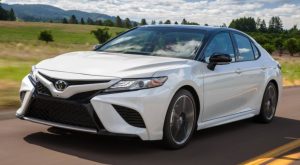
And it then it would cost as much as two or even three Camry hybrids – which many EVs (including the Tesla S) do.
On The Road
Not since the government out-regulated VW’s TDI diesel engines has there been a car that goes this far that only costs this much.
I had a trip planned that would have taken me 247 miles down the Interstate and back again. Only a deer prevented this trip from happening.
Contrast this with the Genesis G80 electric and the Benz EQE 500 electric cars I test drove the week before the Camry. Neither of those two could have made it one way, or maybe just barely. And once having made it there – if they did – I would have been obliged to wait before I could go anywhere, again.
This is hardly the luxury car experience, though both the G80 and the Benz EQE are luxury-branded (and priced) cars. The Camry hybrid gives you the experience without the brand.
Or the hassles.
Or the cost.
For half the price of a mid-sized electric luxury car like the EQE 500, you can drive a car that not only goes almost 700 miles before it needs a little gas, it also has cushy leather seats with heaters, a superb JBL audio system, headlights that turn with you in the curves, a big LCD screen – if you’re into such things – as well as a bird’s-eye view camera system to help with parking, a Heads-Up Display just like the six figure boys and most of all the rest.
It is not, of course, as quick as electric cars – but that’s just the point. Or rather, it ought to be. If the point of all of this is to build a car that uses less energy in order to produce fewer unwanted byproducts and so on, then quickness ought to take a back seat to those values. If it doesn’t, then it’s a fatuity as well as an absurdity. What’s the point of high-performance energy-hog EVs that only a few can buy, no matter how “zero” their tailpipe “emissions”?
But is it quick enough?
That depends on how you define “quick.” It goes zero to 60 in about 7.4 seconds. That’s about two seconds less quick than the Genesis G80 and the Benz EQE. But it is also about as quick as the typical mid-sized/mid-priced crossover, which is what most people who aren’t driving luxury-performance cars are driving. It is also quicker than most of the V8 muscle cars of the ’70s.
Granted, that was 40 years ago – but the point’s valid.
It has enough power – and more usable power – than entirely electric cars. Like them, it has the immediate propulsive thrust that electric motors deliver. Not quite as much, but of a piece. The difference is you can use all it’s got as often as you like and there’s no cost – other than maybe having to stop for a little more gas, a little bit sooner.
The hybrid attributes aside, this is also still a Camry – which means it is one of the most easygoing and pleasant new cars available. It is why Toyota sells more Camrys than almost everyone else sells EVs – combined.
It doesn’t pester or pre-empt you with pushy “assistance” technology. It doesn’t enervate you with over-teched controls. For example, while it has an LCD touchscreen, also has buttons you can touch (by feel, without looking) and knobs – including one for the tuner as well as the volume.
It is a get in and go kind of ride that is analogous to a favorite pair of casual shoes.
Try one on and see for yourself.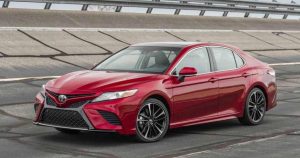
At The Curb
There aren’t many cars left on the market – and fewer that are still selling well. The Camry is one.
The why is obvious – leaving aside the hybrid stuff.
It is, first of all, not a small car. Note that there are almost none of those left on the market. The why is obvious. They aren’t big enough to serve as other than a single person’s car, a second car or a commuter car. Since many people cannot afford multiple cars – and need a car that is big enough inside to serve a family – they buy a crossover, instead. Even the small ones usually have room for 4-5 adults and their things. Most small cars don’t.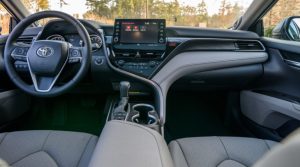
Many large luxury cars don’t.
On top of that, they are expensive.
The Camry isn’t – and it has room for 4-5 adults plus enough space for stuff in a reasonably-large (15.1 cubic foot) trunk. The rear seats have 38 inches of legroom, which is about two inches more than is typical (e.g., the Sonata only has 34.8 inches of backseat legroom) and that makes a big difference. It’s as comfortable in the back as it is up front and that makes it a road-trip car for a family, too.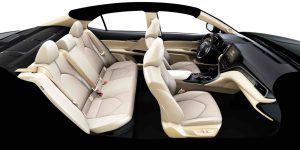
Plus the thing is as close to being an “investment” as any new car is – because unlike many it holds its value exceptionally well and that is a function of it having a gold standard record for being worth something even after 15 years and 150,000 miles. These things are durable and reliable and thus, valuable.
Another desirable thing about this car – based on the fact that hundreds of thousands of people buy one each year – is that it isn’t polarizing in terms of how it looks. Maybe you don’t love it.
Kind of like vanilla ice cream. And there’s nothing wrong with that, either.
The Rest
In addition to the hybrid set-up, the Camry is just about the only new family-priced mid-sized car still available with a V6 engine. If you’re interested in that you may be interested in this.
The Bottom Line
It’s a shame more love isn’t directed at hybrids, which do everything better than electric cars except go as quickly, briefly.
. . .
If you like what you’ve found here please consider supporting EPautos.
We depend on you to keep the wheels turning!
Our donate button is here.
If you prefer not to use PayPal, our mailing address is:
EPautos
721 Hummingbird Lane SE
Copper Hill, VA 24079
PS: Get an EPautos magnet or sticker or coaster in return for a $20 or more one-time donation or a $10 or more monthly recurring donation. (Please be sure to tell us you want a magnet or sticker or coaster – and also, provide an address, so we know where to mail the thing!)
My eBook about car buying (new and used) is also available for your favorite price – free! Click here. If that fails, email me at EPeters952@yahoo.com and I will send you a copy directly!





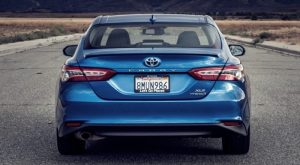








I enjoyed hating on the Toyota Camry as an appliance, but it took EP’s analyses on EV’s to talk about How I Learned to Love the Camry (and any other ICE appliance).
I have made two LA-to-Tucson road trips (400 miles one way) in these last two consecutive weeks. The Mustang Ecoboost can do the whole trip ideally on one tank, but I refuel for safety, for five minutes or so. Having to charge for hours (instead of fast charging) to protect my battery means I am stuck in an area I don’t want to be, exposing me to risks or ne’er-do- wells that I should not have to face.
Which brings us to the Camry providing that margin of safety. On these trips, there are at least three areas in the desert with delays due to construction, plus accidents all along the route. Or any numerous non-recurring unforeseen events that occur all the time because there are so many types of them. Outside of large metro areas I do not see EV’s, except for a lone Tesla, which followed an 18 wheeler dangerously close to take advantage of drafting. In the middle of the desert. Because of any number of events. Because it’s an EV.
If only Toyota would offer the Camry’s hybrid drivetrain in a compact pickup format.
It would be a keeper.
Nice review, nice car! While I enjoy my Prius Prime immensely, this would be high on my list if I needed a new sedan this year! I wonder how Toyota handles the start/stop cycle on that 2.5L engine. One thing the Prius does is use a different type of starter than the standard one that should in theory stand up to the repeat cycles. Did they incorporate that tech into this engine set-up?
No doubt, as gas prices increase, this will be popular.
Hey, hope you’re well after the deer strike. Prob the first video I’ve seen of a journalist pool car thats been wrecked! But hope you got some meat home after that!
Im curious – will they repair it or just write it off? Another point prob worth mentioning is if that was an electric it would prob be written off – if it didnt go up in flames right then!
They won’t even sell the Camry to us over here in the UK any more.
I quite liked the look of the new model TRD spec as well but we are not allowed.
Stupid deer… couldn’t jump out in front of any EV Eric is testing, no. No, it had to be a an ICE car and a nice one at that. The latest versions of the Camry since 2018 or 2019 are some of the best yet. At least the deer is venison now, I hope.
Eric, I’m curious about this Camry. I wonder if it would keep on going even if the battery died since it has the 2.5L engine?
So what was the estimate on the damage to the Camry?
How much more would the shop charge to fix the same damage on, say, a Tesla … assuming that they could get the parts and the battery was not hit — body work only.
With all of this Camry’s admirable and sensible qualities, it will be interesting to see where it will land with respect to the proposed new ICE-killing emissions rules the U.S. government plans to unveil within the next few days. Ditto regarding the proposed new China vehicle emissions rules.
If the government and the eco-nutjobs really wanted to reduce fuel consumption and pollutant emissions, the most practical, affordable way to do it would be to encourage hybrid drivetrains. It’s the best alternative for the driving public as well, as the vehicles ultimately remain gas-powered and retain all the practical advantages of ICE vehicles.
Of course, that’s NOT what they want. They want 100% EVs so that they can control the grid, control your movements, and price you out of personal transportation.
Now, that car makes sense and it comes pre-wrecked, lol. I really do like it and really like the color they sent you. So tempting…..may have to go look at one.
The 2014 Volkswagen Golf BlueMotion diesel, capable of 73.5 mpg U.S. it has a 971 mile range, the perfect car.
The Volkswagen Golf BlueMotion has emissions of 85g CO2 per km. it is even cleaner (less emissions) than a Toyota Prius or an EV….
A current-model large EV car with a battery produced and charged in an average European Union country emits about 88 grams of CO2 per kilometer,
Gasoline engines produce around 40 percent more carbon dioxide (CO2) than diesel engines, catalytic converters cannot reduce the CO2 produced by the engine.
Diesel engines emit more N2O and CH4 then gas engines but there are measures that can be taken to reduce diesel emissions. Diesel fuel catalysts, catalytic converters, and particle filters can reduce emissions greatly.
The air coming out of the tailpipe on a modern diesel is cleaner then the air in a big city.
so this VW diesel gets 3.5 X better fuel economy then the 20.8 mpg EV
and the EV costs 7 times more to run….so what do they do?….they ban the diesel and force you to buy the EV…..why?
A diesel has a longer lifespan then a gas ice engine, there is no battery to replace like in an EV or hybrid and there is no tune ups,
it is far simpler then a hybrid and lighter…
Camry hybrid 3560 lb….
2014 Volkswagen Golf BlueMotion diesel….2480 lb
the new EV’s are over 4000 lb. Volkswagen Golf BlueMotion diesel weighs 40% less….that is why it gets better fuel economy….
A Toyota hybrid won’t run after the battery dies, in EV’s batteries are lasting 7 years…in hybrids?……
2014 Volkswagen Golf BlueMotion diesel $25,200 Starting MSRP
2023 Toyote Camry hybrid $28,355
2014 Volkswagen Golf BlueMotion for sale… $6403.00….buy one…
https://www.motors.co.uk/volkswagen/golf/trim/bluemotion/year/2014/used-cars/
poor people won’t be driving EV’s….they will be walking or taking the bus…which someone just called the mobile homeless shelter……
so this VW diesel gets 3.5 X better fuel economy then the 20.8 mpg EV
and the EV costs 7 times more to run….so what do they do?….they ban the diesel and force you to buy the EV….
The only silver lining in all of this is that, all thing being equal, we will probably be in better shape. One time, I rode 95 miles on a bicycle in a day, back in 2008. I wasn’t in bad shape then.
I tell people that….when they ban all the cars people will have stronger legs from walking…..cars give people weaker legs….
so this VW diesel gets 3.5 X better fuel economy then the 20.8 mpg EV
and the EV costs 7 times more to run
it is clear then the goal was to stop mobility….stop the slaves from driving/moving around…
the slaves are obsolete now….can be replaced by robots and AI, they are also dangerous….what if 7 billion revolt?…..so their numbers have to be reduced
step one….stop their mobility and herd them into 15 min city/prison camp/zones where they can be dealt with….
Anon, before diesels were decreed to be the work of the devil, I always wondered why somebody didn’t make a hybrid with a small turbocharged diesel instead of a gas engine. I imagine the mileage possible with that combination would be phenomenal.
> I always wondered why somebody didn’t make a hybrid with a small turbocharged diesel
VW had a prototype/limited-production model called the XL1, a 2-seat diesel (not turbodiesel) hybrid that was intended to deliver 237 mpg (or 1 L/100 km, as the Krauts reckoned it). They actually achieved somewhere closer to 260 mpg with careful driving. At €110k each, though, it wouldn’t have sold in huge numbers…in any case, only 250 were built.
VW XL1 hybrid diesel for sale
The XL1 was initially unveiled at the Qatar Motor show in 2011. It was fitted with a teeny, mid-mounted 800cc two-cylinder diesel engine producing just 48bhp, which was then linked to a 5.5kWh lithium-ion battery and a 27bhp electric motor, meaning a lofty total output of 75bhp. That power (or lack of it) was sent to the faired-in rear wheels by a seven-speed DSG gearbox.
It was light, though. The body was made from carbon fibre reinforced polymer, the wheels from magnesium and the dampers, steering column and brake callipers from aluminium. ….no rust problems…..
That all meant a 795kg kerb weight, about 1750 lb…….while still meeting all the latest crash-safety requirements. ………no need for modern cars to be over weight…
The body and frame are designed with crush/crumple zones and roll-over protection, and the tandem seating means large side crush zones. Volkswagen claims protection comparable to a GT racing car. The car has anti-lock brakes, airbags with pressure sensors, and stability control…..it only weighs 1750 lb……
why are modern ice cars 3000 to 4000 lb and Ev’s up to 5000 lb or more? they say it was for the so called safety crap….lol
VW says it requires just 8.4 hp to keep the car moving at a steady 60 mph on flat pavement–less than half the power required for the same task in the company’s most economical European production model……why do we need 5000 lb…1000 hp electric cars?
Race-car steering
The unexpectedly fun part of driving the XL1 was the handling.
The unassisted steering–and when’s the last time you drove a car without power steering?–is extremely quick, far closer to that of a track racing car than a street vehicle.
5000 lb EV’s drive like a huge over weight 5 ton truck….lol
and the super slippery body gave the XL1 a drag coefficient of just 0.186, so it remains the most aerodynamic road-going production car ever.
We say production car – only 200 were ever built, so the buyer of this one will join a pretty exclusive hypermiling club. Members of that club will be getting around 313mpg too.
diesel ……so no tune ups like gas ice…
diesels can go 400,000 miles an EV is scrap at 100,000 miles….the very expensive battery is dead…
ATTENTION: The Volkswagen Golf BlueMotion ice diesel has emissions of 85g CO2 per km
the VW XL1 hybrid diesel produced emissions of 21g of CO2 per km…far cleaner then an EV….
A current-model large EV car emits about 88 grams of CO2 per kilometer,…EV’s are way dirtier….lol
Volkswagen XL1 Diesel-Hybrid 300 mpg highway
An average EV gets about 20.8 mpg…
the lowest depreciation….. average used price history $103,970, ….. one sold for $134,000 used….original MSRP of around $128,113….
it was only made in 2015, that is 7 years depreciation…..a $128,000 ice vehicle in 7 years is worth about $42,000…..
after 100,000 miles, about ten years, a $50,000 EV is worth zero because the very expensive…$22,000 to $29,000 battery is dead….
Produced solely for the 2015 model year, the XL1 saw only 200 examples built.
sounds like the best car ever built……with today’s fuel prices….
https://www.topgear.com/car-news/hybrid/buy-volkswagen-xl1-auction-become-hypermiler
This was the reason for dieselgate….the Germans…best engineers in the world….(VW/Audi for small cars)….wipe them out….send all the business to china……all the chinese EV’s headed this way….
The largest British auto dealership, Pendragon, has agreed with Chinese EV manufacturer BYD to sell its cars in the United Kingdom…..give ccp china the whole car market….lol
It also looks like part of the agenda of giving all the manufacturing to china as reparations….the west was too prosperous…so impoverish the west….make china rich….part of the marxist/communist takeover….
It also looks like part of the agenda of giving all the manufacturing to china and india as reparations….the west was too prosperous…so impoverish the west….make china rich…a marxist trick….
Looks like the Japanese are smarter then…..they developed their own manufacturing and cars…..in china’s case it was given to them…..now with the wef the ccp run the planet…..not good…..
don’t let paid government trolls lie to you..
This is what test driver’s of EV’s get in the real world….
travelling 100 miles in an average EV uses 1.20 gallons equivalent of fuel = 41.66 kwh of electricity that is the net amount, but….at the power plant 4.80 gallons of fuel were burnt to get a net 1.20 gallon of fuel equivalent 41.66 kwh used by the EV.
NOTE: 4.80 gallons were burnt to go 100 miles. = 20.8 mpg
at the power plant 4.80 gallons of fuel were burnt to get a net 1.20 gallon of fuel equivalent 41.66 kwh used by the EV………
25% efficiency for EV’s. In very cold weather EV’s are 12% efficient
NOTE:
Thermal efficiency of power plants using coal, petroleum, natural gas or nuclear fuel and converting it to electricity are around 33% efficiency, natural gas is around 40%. Then there is average 6% loss in transmission, then there is a 5% loss in the charger, another 5% loss in the inverter, the electric motor is 90% efficient so another 10% loss before turning the electricity into mechanical power at the wheels.
33% – 6% – 5% – 5% – 10% = 25% efficiency for EV’s.
In very cold weather EV’s are 12% efficient….so 10.4 mpg….lol
More losses..it is actually worse…..lol………An EV just sitting loses:
tesla says a daily 3%-5% stationary range consumption.” (just parked)
greene says 100 mpg for EV’s because he lies and can’t do research….lol….low IQ problem….
Toyota says a Prius or camry hybrid battery will last between 100,000-150,000 miles or between 8-10 years.
After ten years a Toyota Camry hybrid has a residual value of about 21% ….. 0.21 X $28,000 = $5,880……
After ten years the car is scrap…..residual value $5880….battery replacement cost ….$7584…stick with ice engines…….this is good for toyota….people buy more often….
The Average Cost for a Toyota Hybrid Battery Replacement Is $7,493-$7,584 Depending on If You Go to the Mechanic or DIY……..not including any taxes, exchange fees, or other expenses.
Cost at the Mechanic: $7,493-$7,584……….Parts: $7,185-$7,195….plus Labor: $308-$389
Cost to DIY: $7,185-$7,195
camry hybrid cost over 400,000 miles with two battery replacements $43,523
Volkswagen Golf BlueMotion diesel cost over 400,000 miles with no battery replacements needed $25,200
400,000 mile fuel cost
camry hybrid at 50 mpg and $3.59 gallon = $28,720
Volkswagen Golf BlueMotion diesel at 73 mpg and $4.09 gallon = $22,410
Toyota says a Prius or camry hybrid battery will last between 100,000-150,000 miles or between 8-10 years
NOTE: EV batteries are lasting about 7 years….hybrid batteries don’t get ruined by fast chargers, running below 20% charge..or…..the EV owner’s sledge hammer when he finds out how useless and defective his EV is….and having to tow it all ther time when it dies….lol….
80% of EV buyers say they won’t buy another one…..so EV’s are doomed….they will run out of stupid people to buy them….unless…the government pays 50% of the cost with your tax dollars….
$28,355 camry hybrid cost over 400,000 miles with three battery replacements $50,752
Volkswagen Golf BlueMotion diesel cost over 400,000 miles with no battery replacements needed $25,200
camry hybrid 400,000 miles at 50 mpg and $3.59 gallon = $28,720
Volkswagen Golf BlueMotion diesel 400,000 miles at 73 mpg and $4.09 gallon = $22,410
$50,000 Tesla EV cost for 400,000 miles with three $22,000 battery replacements = $116,000
Tesla EV recharging cost 400,000 miles @ $0.15 per kwh = $24,996
Tesla EV recharging cost 400,000 miles @ $0.40 per kwh = $66,656
Car cost plus fuel cost for 400,000 miles…
camry hybrid with three battery replacements $79,472
Volkswagen Golf BlueMotion diesel $47,610
Tesla EV with three battery replacements $140,996 @ $0.15 kwh
Tesla EV with three battery replacements $182,656 @ $0.40 kwh
Car cost plus fuel cost for 400,000 miles…
Volkswagen Golf BlueMotion diesel $47,610
Tesla EV with three battery replacements $140,996 @ $0.15 kwh
Tesla EV with three battery replacements $182,656 @ $0.40 kwh
clearly the goal is to stop the poor slave class driving around…it will be far too expensive….as soon as there is cheap reliable transportation to give slaves freedom…cut it off….make them walk…
I would n remain anonymous too if I made up as many FALSE numbers as you did for a so-called analysis.
Almost no car lasts for 400,000 miles.
Only 1% of vehicles make it past the 200,000 mile mark. Just 0.03% of cars roll over the 300,000 mile mark.
Your analysis is worthless for several other reasons too:
“NOTE: EV batteries are lasting about 7 years”
Your clam that EV batteries last 7 years is FALSE. The correct number is 15 to 20 years.
Your claim that “An average EV gets about 20.8 mpg” is FALSE.
The correct number is about 100 MPGe
MPGe definition:
The Environmental Protection Agency (EPA) came up with the unit of measurement for the electric car’s energy consumption level so it can be compared with gas-powered vehicles. Every window sticker at the dealership is federally mandated to show the MPGe when it’s an electrified car or MPG when it’s a gas-fueled vehicle.
Your claim that “The Average Cost for a Toyota Hybrid Battery Replacement Is $7,493-$7,584”
is FALSE.
The correct range is $2,000 to $4,000. And the Prius will run without a battery if you need a new one and can’t afford one.
“80% of EV buyers say they won’t buy another one…..so EV’s are doomed”
Your 80% claim is FALSE
96% of Canadian EV owners recently claimed they WOULD buy another EV.
US EV owners could not be significantly different than Canadian EV owners.
https://driveteslacanada.ca/news/survey-of-over-16000-canadian-ev-owners-finds-nearly-all-are-not-going-back-to-ice/
A recent article on a related Gallup EV poll:
https://www.cnsnews.com/article/national/michael-w-chapman/gallup-only-4-americans-own-electric-car-41-unequivocally-will
Yours is the least accurate online comment section “analysis” that I have read in years, perhaps in DECADES.
Richard,
The age of the average car currently in daily use is almost 13 years old. Assuming the average 12,000 miles annually, that means it is common for cars to have 150,000-plus miles on them. Many of these go to 200,000 and more before needing major work.
On EV battery life: EVs haven’t been in significant circulation (much less in use as daily drivers) for even five years, let alone the “correct” 15-20 years (of battery life) you state. There is as yet no meaningful real-world data to know just how long these EV batteries will last in everyday use over time. But we do know that heavy discharge/recharge cycling shortens the service life of every battery known.
The average miles driven per year is 13,500 but the average EV mileage in only 7,000.
The long mileage vehicle statistics in my last comment were averages.
I once had a relative who drove her Honda Accord 350,000 miles. Bragged about it all the time. Her husband was a rich dentist, so I didn’t get it. They did excessive maintenance — such as an oil and filter change every 3,000 miles, tranny fluid changed every year, and other services much more often than their owner’s manual recommended.
The first Tesla was 2008 model — 15 years ago.
The General Motors EV1 was an electric car produced and leased by General Motors from 1996 to 1999.
There is enough experience to make a reasonable 15 to 20 years battery life estimate. With no fast charging, of course.
A now retired EV electrical engineer told me in late 2022 that 15 to 20 years was a safe estimate at 7,000 miles a year, with no fast charging. He wasn’t sure about 15 to 20 years at 13,500 mies a year — he claimed EV drivers won’t take many long trips, so will not drive as much as ICE car owners.
The EV engineers, in general, dislike the EVs they are working on, except for the fast acceleration.
Those engineers have analyzed EV battery condition and performance in older EVs to see how fast they are deteriorating. … Even after 15 years, the batteries will still function. You might have lost 10% of the range, or 20%, but that is not a catastrophic failure of the battery pack. Some owner’s manuals may claim up to a 40% range loss but that large of a range loss requires a lot of fast charging.
The early field data on EV battery condition is biased by how few miles a typical EV driver uses his vehicle in a year. I’ve read that 5,000 miles a year was the average annual mileage for EVs in in California in 2019.
Hi Richard,
A car driven only 7,000 miles annually is a part-time car, an occasional use toy. This makes much of my point regarding EVs; i.e., that they are the indulgences of the affluent (who can afford to buy/own multiple vehicles) as opposed to what most people have cars for – which is to transport them where they need to be go, every day – all year long.
The first Teslas were sold 15 years ago. A very small number of boutique exotics (they were converted Lotus sports cars). I doubt any of them were driven much in winter. Same for the EV1 (which I personally test drove, so I can talk about that more than academically). It’s absurd to use them as the basis for any general-scale estimation of battery life in day-in-day-out use under all the usual climate variations, etc.
You state 20 percent loss of charge capacity is acceptable. To whom, exactly? Would you accept the loss of 20 percent of your car’s driving range – especially if all you had to start out with was the 270 or so miles most standard-battery EVs tout as their maximum, best-case range?
Take away the “fast” charging and an EV is as useless as a car that only starts every other day. Maybe that works for the person hwo has a second car to drive while the EV trickle charges?
Thanks for the good laugh, at any rate.
Glad to hear my comment left you laughing. Some of my prior comments have left you angry.
I never said a loss of EV range of 10% or 20% was good news. But if that is a typical loss of range after 150,000 miles of use, that does not make a 150,000 mile EV worthless, with a new battery pack mandatory.
The engineers can measure the deterioration of EV batteries over time and extrapolate a loss of range at 150,000 without having many EVs with 150,000 miles or more to study. They are estimating a range loss in the 10% (with no fast charging) to 20% (with some fast charging at 150,000 miles). Some owner’s manuals will say 10% to 40% range loss, with the 40% for EVs with frequent fast charging.
I have bever said anything good about EVs except for their fast acceleration, which some drivers will enjoy.
But I refuse to lie about EVs, or exaggerate their faults, as anonymous 1 has done.
EVs are bad news when considering THE TRUTH about their high price and refueling inconvenience.
There is no reason to exaggerate their faults, or speculate about how bad they are.
One EV engineer claimed EVs should cost a lot less than ICEs so customers could afford to buy two of them: One to drive, and the other to charge in their garage. I’m not sure if he was joking, or even exaggerating.
My 2005 Toyota Camry got 24mpg on short trips around town when new. But only 22mpg after 200,000 miles. That mpg deterioration did not make the vehicle completely worthless, or in need of a new engine.
Concerning the Camry review:
If they still offer an LE and SE version. the LE version is best for normal bumpy roads. The SE version has a stiff suspension that’s great only on smooth roads.
I preferred the LE suspension because SE Michigan roads are far from smooth. The wife prefers the SE suspension because she gets nauseous from a bouncing car. with a soft suspension.
So we got the SE suspension for her 2016 Camry. I use a 32psi tire pressure for the front tires, and 30psi for the rear tires, to soften what would otherwise be a very stiff ride … that reminds me of the stiff spring Mustang GT suspensions in my distant past.
Richard,
The loss of 2 MPG is not comparable to the loss of 20 (or even 10) percent of an EV battery’s charge capacity. Also, the loss of capacity is far more significant vs. your loss of 2 MPG because the EV starts out with about 50 percent less range than a non-EV. So now you must stop (and wait) even more often. And that means more discharge/recharge cycles, likely to accelerate the process of the battery pack’s demise.
Richard,
“Extrapolation” is not real-world. Ask an engineer about this. Ask anyone who designs/builds machinery or anything else that must stand up to regular hard use, in variable/unforseable conditions.
I do no say you are lying about EVs. I simply state that what you say is false.
greene
you are obviously a paid ccp/wef government troll….everything you said is bs….quit spreading misinformation/disinformation….
You were caught lying about EVs and now you are angry, like a child. I don’t waste my life lying about EVs. They are too expensive and too inconvenient. The truth about EVs is bad enough. No one should be forced to buy one.
I also do not remain anonymous because I stand behind everything I write online.
Richard Greene
Bingham Farms, Michigan
BS, MBA
hahaha….you are full of it….lol
greene always spreads the ccp/wef/communist narrative
EV’s big pharma, etc.,
must be a paid troll or a ccp/wef bot….lol
greene
everything you said about EV’s is total bs…it just repeats the lies spread by the government
go and do some research….your knowledge of cars is a joke….
Your analysis is worthless for several other reasons too:
haha….greene you are worthless….lol
Your claim that “An average EV gets about 20.8 mpg” is FALSE.
The correct number is about 100 MPGe
hahaha
the stupid GM ceo said the same thing…..that is at the wall plug number…..there is a power station ….low IQ …lol
greene thinks electricity comes out of a wall plug….lol….idiocy
Your clam that EV batteries last 7 years is FALSE. The correct number is 15 to 20 years.
you are a paid troll idiot
the latest data shows EV batteries last about 7 years….probably because they get wrecked at fast chargers and being drained down past 20% charge….
you are so full of crap….you have to be a paid troll….and a dumb one….lol
greene
how stupid are you?
a 4500 to 5000 lb car can’t get 100 mpg….that is impossible….
NOTE:
there was VW and Mercedes diesels lasting 400,000 miles….and diesel powered heavy trucks will last one million miles….
there was an ice Volvo that lasted over one million miles also….https://www.motor1.com/news/529418/gordon-volvo-p1800-close-look/
I owned two VW diesels that had 300,000 miles and ran perfectly….go to tdiclub.com there is owners of VW diesels there that lasted 400,000 miles
Can a car last a million miles?…..yes….so 400,000 miles for a high quality diesel is possible
15 Cars With The Highest Mileage Ever Recorded
https://www.hotcars.com/15-cars-with-the-highest-mileage-ever-recorded/#2006-ford-f-250-ndash-1-2-million-miles
Toyota did a wonderful job with this model. Affordable, stylish, and practical. Now look for the feds to come up with a bullshit reason to ban them. They can’t have a practical car to compete and beat out the EV’s.
The EPA will restore the 55 MPH speed limit as Federal policy and, thus, change the way MPG testing gets done, reverting to the old tests using lower speeds and fudged highway numbers which were subject to political influence.
Whether or not the states revert to 55 MPH doesn’t really matter. The goal isn’t about improving saaaafety.
Eric,
Scotty Kilmer just did a video about a Toyota Prius. It had 140K on the clock, and the original battery was just fine. He said that the way you can tell if a hybrid’s battery goes is that the gas mileage will drop; since the Prius’ didn’t drop, it was still good. There’s real life proof of what you say, i.e. batteries that aren’t deep cycled often will last a lot longer.
Predictable puff piece by a think-tanker in Forbes about how outlawing internal combustion is going to reduce emissions, save consumers money, and create jobs jobs jobs. The model says so:
https://tinyurl.com/2ymwjsd5
No mention of where the electricity is going to come from.
LOL where else are you going to watch a video review of a wrecked fleet vehicle. Were you able to tag the deer for the freezer?
Despite being bigger and heavier, this car gets significantly better mpg than our ’23 Corolla Hybrid, which is all-wheel-drive. Any thoughts on Toyota’s AWD?
We had been on the waiting list for a Corolla Hybrid for four months, so when this one came in we thought we should jump on it even though I didn’t really want the AWD.
Purdy cool place on the planet to be, right where you are.
Never disappointed with all of the motor porn. lol
Always a good read here, just matter of fact down to earth straight forward analysis and review of another automobile in the universe.
Saw a Camry the same color at a stop light just last week, thought to myself, that it is a nice car.
Toyota is meticulous and impeccable for basic design in transportation and motor reliability.
Your mind has been raped. Menticide is the goal.
Dot gov porn and all of its war porn is nothing more than a devious plan to kill your mind, nothing else. The propaganda porn does it.
You can just ignore it, it won’t go away, however, it will eventually kill itself dead.
Your brain is a functioning organ, feed it right. Your stomach rules, needs good food.
Feeds your brain. Can’t be spoon fed gov propaganda night and day, that’s junk food for the brain-dead.
It is not capturing hearts and minds, your soul, it is the rape of the mind.
You don’t have to be physically dead, menticide works too.
Klaus’ brain is dead, that much I know.
It’s driving Klaus mad.
“This is hardly the luxury car experience…” you said about the Mercedes and Genesis EVs.
With cars like the Camry Hybrid, who needs them? In fact, you raise a good point that most luxury cars aren’t worth it.
Back in the days when your Pontiac and my Oldsmobile were new, having a luxury car like a Cadillac/Lincoln/Imperial, or even almost-luxury cars like Electra 225s/98s/Grand Villes/Marquis/New Yorker meant something—and you got something you couldn’t get in Novas/Falcons/Darts/Valiants (Well, if you knew the right people and checked the right boxes on the order form, you could anyway.)
When you can get power everything, automatic climate control, leather seats, fantastic sound and security systems, and a decent ride with a Camry/Accord/Legacy, and when these cars are cheaper and more reliable, who needs a luxury car?
EXACTLY! A year or so ago, I got into it with a Tesla afficionado on Twitter. I pointed out to him that my Ford Focus cost 1/3 of his Model 3, yet did 80% of what his car did. He scoffed by saying that his car was a LUXURY car! He pointed out that my Focus wasn’t a luxury car. I pointed out to him that, when I was growing up, things like power windows, power door locks, power mirrors, cruise control, etc. were only found on luxury cars; I then went on to say that my Focus had all these things, so, AFAIAC, it was a luxury car too. It certainly has all the ingredients of the luxury cars of yore, and that’s enough for me. The guy didn’t have much to say after that… 🙂
I bought a 2021 Camry a year ago. It has the nice heated leather seats, and heated steering wheel too. Which is wonderful in -40 below Winters. Lots of leg room and trunk space. The few safety crap stuff I was able to turn off, and have had no problems with them since then. Also, as it was my first automatic trans in forever, (still lookin’ for that clutch pedal-ha ha), the auto start was a helluva lot cheaper to install. For luxury, it fits my every day, go-to-work lifestyle, and it it waaay more comfortable than the WRX, racer car seats. And, it handles the snowy roads well enough, albeit, I still think I have better control over my older standard WRX car. It was a trip relearning how to drive on snowy roads with an automatic after all these years. Overall, I like the Camry, and this one is not a hybrid. When I bought it, there were not a lot of options (thanks to COVID), but this one, I think, was a good choice all-around.
On a road trip last summer, I consistently managed 46-47 MPG with my non-hybrid 2018 Camry 2.5 L, almost 600 miles of range on the freeway on a full tank of gas.
I did have the fuel pump replaced under the recall, but, otherwise, the vehicle is the same as when I drove it home from the dealer.
The huge downside of the vehicle has been the strange behavior of the 8-speed automatic transmission, but, from what I understand, Toyota solved the issues in later years.
Hey Roscoe – How fast did you drive on that road trip. 47 mpg seems pretty high for a 75 mph highway trip.
I drove a 2018 Camry as a rental during that Christmas. Excellent car. Had great road manners, drove it like 90 mph most of the trip and I managed 30-32 mpg the entire trip.
The car was quiet, handled well, and had long highway legs. I should have bought one. It would be paid off by now, except I wanted an SE, with a little stiffer suspension
I drove ~ 70 MPH consistently on the freeway.
Again, the car is a 2018, and the transmission has been altered since that model year to address complaints about lag as the system hunts for gears when a decelerating and a sudden burst of speed becomes necessary to avoid a problem.
2018 was the first year of the current generation Camry, and the quirks of the new 8 speed transmission turned off a lot of long-time buyers of the car, despite the high MPG numbers in the 2.5 L 4-cyl models not in “Sport” mode.
I never noticed a bad transmission issue. It was a little more squirrly than before, but not too bad. 70 mph is kinda slow, but that is great mileage for a 3400 lb car. I wish I had the cash for one.
I also used ethanol-free gas when available. It wasn’t hard to get in Texas or Tennessee.
I have not clocked highway mileage on my non-hybrid. Combined highway and town traffic, I am averaging about 30 mpg’s. Which is far better than the 20 mpg’s I get with my old, WRX, back in the day. Due to habit, I do stick the mid-grade gasoline in it, but do not think the car needs it. Still need to read the owner’s manual on it. But that alone saves me a bit of money, not having to put the highest grade fuel in it. I wish I could get 47 mpg on mine, but am happy with the 30.